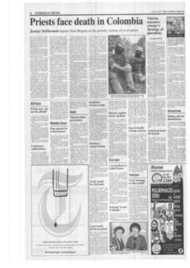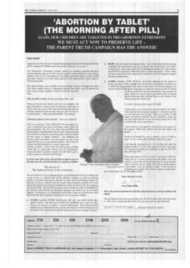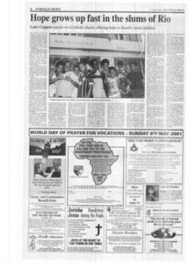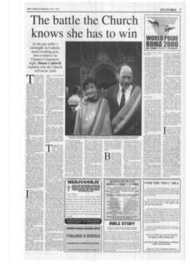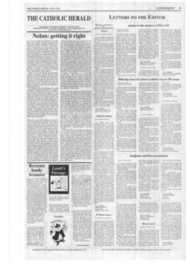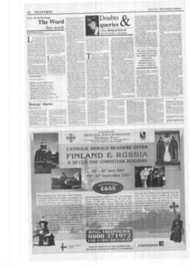Page 2, 4th May 2001
Page 2
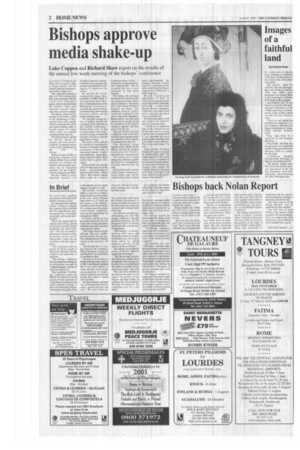
Report an error
Noticed an error on this page?If you've noticed an error in this article please click here to report it.
Tags
Share
Related articles
Bishops Oppose Offensive Against Saddam Hussein
Bishops Deplore 'partisan Stalemate' On Iraq
Irish Bishops Question Iraq Embargo
American Bishops Say Iraq War Lacks Legitimacy
Us Bishops Call For Peace In Bosnia
In Brief
THE BISHOPS have urged the international community to lift blanket sanctions on Iraq.
In a statement following their bishops conference meeting, they expressed their belief that the UN comprehensive sanctions against Iraq "are humanly catastrophic and morally indefensible".
While they agreed that the military power of Iraq's present government needed careful monitoring and control, they said: "This does not justify a programme of sanctions where the primary victims are the Iraqi people at large who are powerless to affect the regime's policy.
"The conference asks for prayers for all the people of Iraq whose suffering is directly related to the imposition of sanctions.
"The bishops' conference does not regard this suffering as an unfortunate example of 'collateral damage' in pursuit of legitimate objectives."
They concluded: "The bishops' conference urges the British Government to work urgently for the suspension of comprehensive sanctions at the earliest possible moment, so that a new relationship with the Government and people of Iraq can be initiated, and the current impasse brought to an end."
The bishops' conclusions follow a report by an international delegation to Iraq, earlier in the year, which included representatives of Cafod, the aid agency of the bishops' conference and Fr Frank Tumer Si, assistant general secretary of the bishops' conference, with special responsibility for international affairs.
Fr Turner said that he was personally affected by his role in the visit to Iraq undertaken earlier this year and came back with renewed vigour.
"The reality was personally affecting. This was a middleincome country 10 years ago. The suffering has been directly caused by the sanctions," he said.'
"We feel that this is a very key time for the statement. Policy formation is going on and therefore it is a good time to contribute to that.
"It looks as if everyone is finally realising what a mess it is. Mr Cook himself admitted that it was most unlikely in future that they would design any programme of comprehensive sanctions because the people they want to control don't get hurt."
He agreed that the statement was a criticism of the Government's present position and said: "We have made our concerns with the Government's position clear over the last three years."
THE BISHOPS also called upon the British Government to increase its efforts for peace in the Holy Land and expressed sadness at the continued strife in the area.
In a statement after their low week meeting, they said: "The bishops' conference urges the British Government and the European Union to involve itself more fully in the process of negotiation.
"The bishops' conference observes with sorrow and dismay the continued violence in the Holy Land, and its escalation, which has caused immense suffering to all sections of the population."
The bishops questioned the extent of Israeli reprisals against the Palestinians.
"The international community must judge whether these are reprisals which amount to a level of collective punishment that denies universally recognised human rights," they said.
They also drew attention to the status ofJerusalem as a city open to the peoples of two nations and three faiths, as confirmed by UN resolutions. This they felt should be "the continuing basis for a just peace". In conclusion, the bishops offered their "particular support for the Church in Jerusalem and in the Holy Land".
THE BISHOPS' conference called for more efforts to be made by the British Government and the international community to reduce the debt of the developing world.
The bishops praised the Government for taking a lead on the issue of international relief for unpayable debt, but called for increased efforts.
"The bishops' conference appreciates the Government's leadership in striving for the I cancellation of the unpayable debts of the world's poorest countries."
The statement also said: 'The bishops' conference urges the Government to continue to work for a 100 per cent cancellation of the debt of these same poor countries to the International Monetary Fund and the World Bank, so that such debt repayments may instead be channelled to the goals of poverty reduction and social development."
The bishops concluded by asking the Government to plan for the future of poorer nations and to attain international development targets to halve the number of those in extreme poverty by the year 2015.
blog comments powered by Disqus





